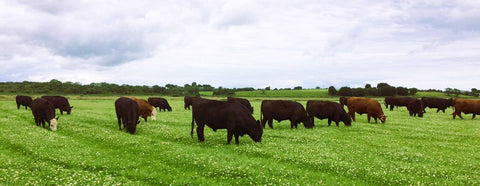
The Environmental Impact of Grass-fed vs Grain-fed Beef Production and the benefits for the planet and your health
Grass-fed and grain-fed beef production methods have different environmental impacts and health benefits. Grass-fed beef is raised on pasture and eats grass and forage, while grain-fed beef is raised in feedlots and fed a diet mainly consisting of grains such as corn and soybeans.
The environmental impact of grass-fed beef production is generally considered to be more positive than that of grain-fed beef. Grass-fed beef requires less energy and resources to produce, as cattle are able to graze on open pasture and do not require intensive feed production and transportation. Additionally, the use of pesticides and fertilizers is typically lower in grass-fed beef production, as there is less need for monoculture crops and concentrated feed operations.
On the other hand, grain-fed beef production has been associated with a range of environmental issues, including deforestation, water pollution, greenhouse gas emissions, and soil degradation. The production of large quantities of grain for cattle feed requires vast amounts of land, water, and other resources, and contributes to the loss of biodiversity and ecosystem destruction. The feedlot system also produces large amounts of manure, which can pollute water sources and release methane, a potent greenhouse gas, into the atmosphere.
In terms of benefits, grass-fed beef production can help mitigate climate change by sequestering carbon in the soil through proper grazing management. Grazing can also promote healthy soil and plant diversity, and support wildlife habitat. Additionally, grass-fed beef is often higher in omega-3 fatty acids, vitamin E, and other nutrients than grain-fed beef. It is also free of hormones and antibiotics that are commonly used in grain-fed beef production.
Choosing grass-fed beef can therefore be a more environmentally sustainable option, and may also offer additional health benefits. It can contribute to reducing greenhouse gas emissions and preserving biodiversity, while also providing more nutrient-dense meat. It can also be free of harmful substances like antibiotics and hormones, which can potentially affect human health. Therefore, choosing grass-fed beef over grain-fed beef can benefit both the planet and your health.

